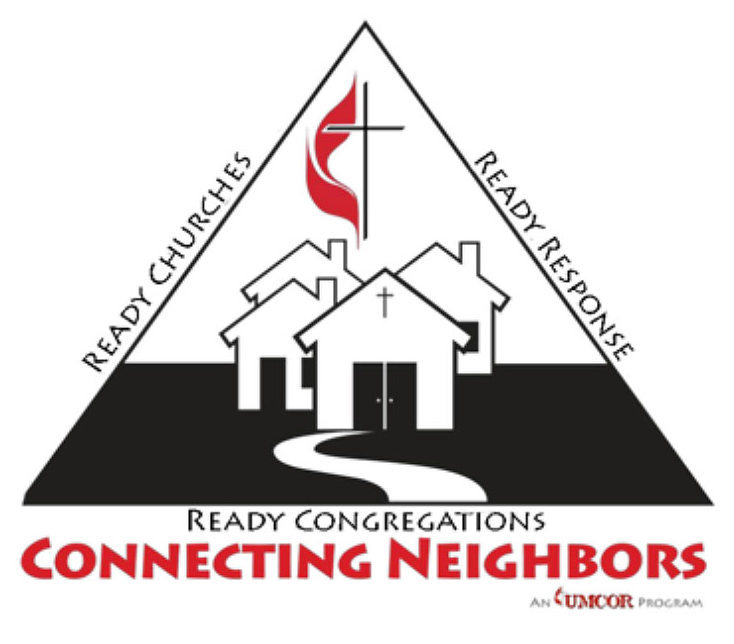Connecting Neighbors
Ready Families and Congregants
Adapted for Response During a Viral Pandemic (COVID-19)

“Each of you should use whatever gift you have received to serve others, as faithful stewards of God’s grace in its various forms.” — 1 Peter 4:10
The Connecting Neighbors program was designed to prepare our churches to respond to disasters of all types including the current coronavirus. These guidelines are focused on the first part of the Connecting Neighbors program — ourselves, families and fellow congregants.

First Steps
Take care of yourself and your family. Then you will be ready to reach out to others
We cannot effectively minister to others if we have not ensured our families are safe and prepared to take care of each other.
- Plan and prepare for the possibility of self-quarantine. Establish your own family, friends, and relatives communication plan that includes how you will communicate with each other. This should include alternative means of communicating should regular communications be interrupted or overloaded if the virus worsens. Have another church member or neighbor be an interim contact for family members if your communication plan fails.
- Have a 14-day supply on hand of food, prescriptions, Over-the-counter medications, basic necessities (i.e. personal, hygiene products, sanitary supplies, diapers, pet food.) Refer to the American Red Cross “Survival Kit” list at: https://redcross.org/gethelp/how-to-prepare-for-emergencies/survival-kit-supplies.html
- Keep your vehicle’s gas tank at least half full.
- Arrange for mail delivery if you live in an area where your mail is delivered to a central location.
- Arrange for wellness checks by a family member or friend, if quarantined.
- Know your medical provider’s contact information.
- Arrange for transportation to a medical facility, if needed.
Ready Congregations
Ready Congregations
- Create a decision-making team (pastor, lay leader, worship, finance, trustees?) that can make decisions quickly.
- Identify a leader (other than the pastor) who will coordinate a team of volunteers and be responsible for the church’s response to the pandemic.
- List the church’s resources. Include physical and communication resources as well as the gifts and talents of the church members.
- Establish or use an existing “phone tree” or other method of connecting with congregants. Consider and adapt to preferences and accessibility concerns as much as possible. Test your process to make sure all your regular members and frequent attendees can be reached.
- Make a list of your most vulnerable members, shut-ins, and others with special needs. Check in with these individuals regularly by phone (don’t rely on text or email) to make sure they are doing well and ask the following:
- Ask how they’re doing —
- Ask permission from members to share information as needed.
- Do they have someone to help them — a care giver or someone else?
- Do they need anything they can’t get for themselves?
- Do they use a grocery delivery system or a meals-on-wheels service, etc.?
- Do they need groceries, prescription medicines, etc.? Don’t assume you know what they need and remember they may be isolated because of the virus.
- Identify spiritual/emotional needs for additional follow-up.
- Minister spiritually to congregants in need. Consider Lay Ministers, Stephen Ministers and others who have some training in caring for others.
- Use existing small groups to meet the needs of the congregation during the term of the pandemic.
- Establish a communication strategy to keep members informed of the status of the disease, the needs of the congregation, and activities and events scheduled or canceled. Use existing teams already in place to carry the messages forward. For large churches, establish a communications team if necessary.
- Continue to follow the recommendations of the state and federal health authorities to lower your risk of exposure.
- Download the apps to get alerts or updates from these agencies.
- Get your household ready for COVID-19 from the CDC
- Checklist for household readiness for COVID-19 from the CDC
As you plan, prepare and respond to the coronavirus, remember that we are also called to care for our neighbors. Please feel free to share this with your neighbors, with other faith-based organizations and others who may benefit from this information.
Additional Resources
If you have questions concerning this checklist, need assistance, or want more in-depth training please contact:
-
Terry Reddick(253) 381-6576
cricketnw@wavecable.com -
Kathy Bryson(509) 539-2978
brysonpnw@gmail.com -
Louise Kienzle
(541) 620-0989
drc@umoi.org